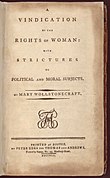Wikipedia:Today's featured article/requests/A Vindication of the Rights of Woman
A Vindication of the Rights of Woman
[edit]- This is the archived discussion of the TFAR nomination for the article below. Subsequent comments should be made on the appropriate discussion page (such as Wikipedia talk:Today's featured article/requests). Please do not modify this page.
The result was: scheduled for Wikipedia:Today's featured article/July 2, 2022 by Jimfbleak - talk to me? 18:19, 7 June 2022 (UTC)
A Vindication of the Rights of Woman is a 1791 book of feminist philosophy by Mary Wollstonecraft, responding to 18th century educational and political theorists who wanted to deny women an education. She argues that women ought to have an education commensurate with their position in society, claiming that women are essential because they educate its children and because they could be "companions" to their husbands. Instead of viewing women as ornaments to society or property to be traded in marriage, Wollstonecraft maintains that they are human beings deserving of the same fundamental rights as men. She was prompted to write the book by Tallyrand's 1791 report to the French National Assembly that women should only receive a domestic education; she used her commentary on this specific event to launch a broad attack against sexual double standards. Wollstonecraft wrote the book hurriedly; she intended to write a more thoughtful second volume, but she died before completing it. (more...) (Full article...)
- Most recent similar article(s): don't recall anything similar in months
- Main editors: Wadewitz
- Promoted: 2007
- Reasons for nomination: I thought of Adrienne today, and that we haven's seen her stellar work on the Main page since Mary Shelley. The topic of the book from the 18th century - women not an ornament nor property of men - is good anytime, I think. This one appeared in 2009 last. Usually I try to reword the lead for a rerun, but I find this so well phrased, and so long ago, that I just left it as it was then, only shortened a bit to comply with today's tendency to have blurbs shorter.
- Support as nominator. Gerda Arendt (talk) 07:47, 14 May 2022 (UTC)
- Support Googleguy007 (talk) 03:39, 17 May 2022 (UTC)
- Support Gog the Mild (talk) 17:10, 17 May 2022 (UTC)
- Comment - this is currently listed at WP:FARGIVEN with concerns about original research. Have these concerns been addressed? Hog Farm Talk 18:22, 17 May 2022 (UTC)
- The question I see is: Does one sentence in the lead summarise the prose, or does it go beyond and can be regarded as OR, because the wording is too different? I can't tell, English not being my first language. A short description of the context of the French revolution was also marked as possible OR. Another question raised was ALLCAPS which I can't detect. A fourth was punctuation before references, which I can check. --Gerda Arendt (talk) 20:26, 17 May 2022 (UTC)
- I checked for punctuation before ref, and found it to my liking. What do I miss? --Gerda Arendt (talk) 20:29, 17 May 2022 (UTC)
- I know nothing of the subject, so can't judge well if the OR is present or not, but the punctuation issues appears to be if the article follows the format of quote". or quote." (period before or after quotation mark). Hog Farm Talk 20:38, 17 May 2022 (UTC)
- Support Made a minor change to the blurb. Hawkeye7 (discuss) 21:53, 23 May 2022 (UTC)

